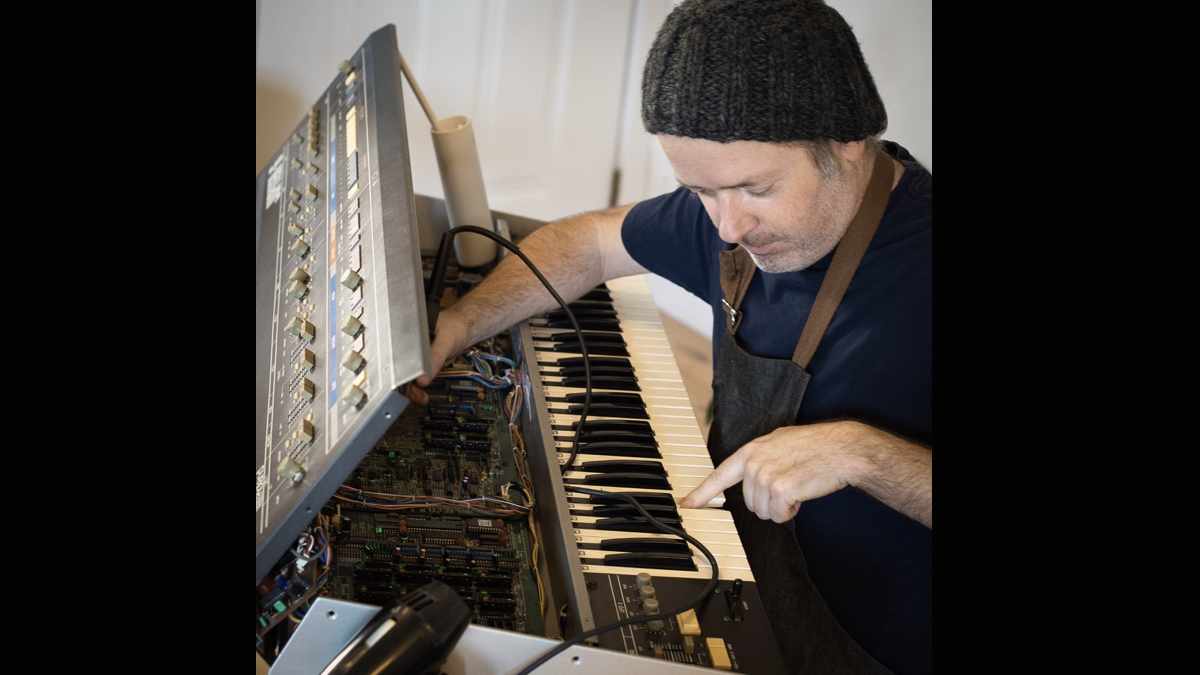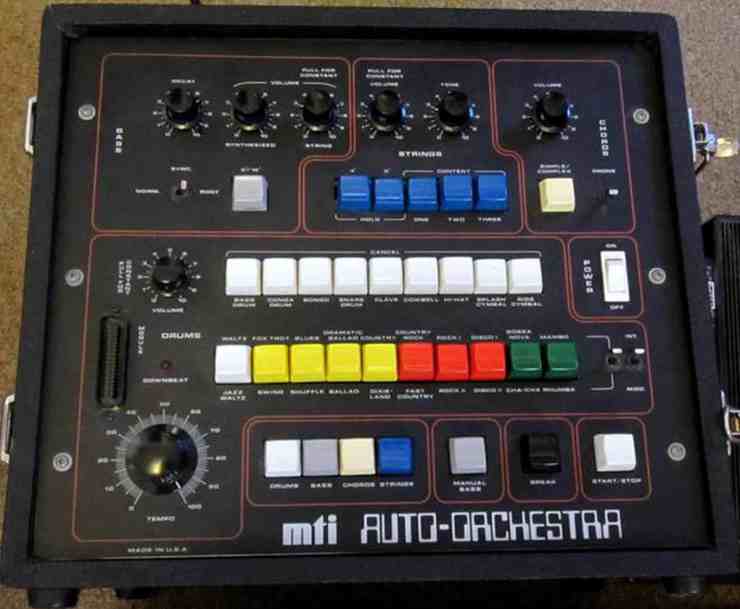Analog
Vintage Synth Tech Michael Boomer’s Sage Advice

A conversation with Kays Al-Atrakchi, with some great quotable lines
Michael Boomer has been repairing vintage synths at his Los Angeles-based LA Synth Co. for the better part of a decade. Boomer (as he prefers to be called) started working on musical instruments in his early teens at his parents’ music store. After a stint as a touring musician, he turned to his true passion by working first at TDM Electronics, then Royer Labs, until finally landing at Roland.
There, under the guidance of legendary Roland technician Mark “Spook” Larson, Boomer learned the craft of repairing synthesizers, which ultimately encouraged him to start his own repair business.
(This interview has been edited for clarity)
What was the first synth you worked on?
To my best recollection the first thing I worked on with keys was probably either a Korg O1/W or an M3. The first vintage gear at Roland that I worked on was Dr. Dre’s TR-808. I had never seen the insides of a TR-808, and they were like – here you go! Thankfully I understood the ins and outs of how it worked. It’s a fairly simple machine as far as electronics go.
Did you go to engineering school?
No, but it definitely crossed my mind. As a kid I thought “well, anything they can teach me I can learn myself,” which is completely foolish. I had a lot of stupid confidence that comes with being that age. I definitely took things on that were above my weight and I got lucky, or I happened to understand it better than I thought I did, which encouraged me to keep doing it.
I was very fortunate to work with Rick Perrotta and David Royer at Royer Labs, and Mark Larson and all the people at Roland. I got to learn from the best and I’m very fortunate.
Are there any synths that you enjoy working on more than others?
Roland synths will always be to me somewhat like my children. I am partial to Japanese construction, all that bubble era stuff. The construction is just so well done. If you’ve ever opened up a Yamaha DX-7 or a Korg M3, it’s made of metal. The brackets are perfectly laid out and all the screw holes match, and everything is square and tight.
I also like working on really oddball stuff like vintage Space Echoes, because they’re kind of like pinball machines. They’re like a living, breathing, electromechanical machine and they’re interesting, they just have a little more life to them.
One of the quirkiest things that I like working on is the MTI Auto Orchestra. I think those are the coolest thing in the world. It’s for a one man band. It’s a bass line, a backing track, and a drum pattern, and they’re just weird, kind of like the accompaniment built into an organ from the ’70s, but it’s all in one box.

Anything you don’t enjoy working on?
The stuff that makes me absolutely cringe is Italian-made synthesizers. The main problem is the poorly made connectors. If you break a multi-pin connector on it, you have to rewire the whole thing, and there’s a whole bunch of unreliable workmanship on top of that. So you end up with things that aren’t square and when you put them back together, there are pins crossing and things tweak and you end with a number of different issues that will make you want to pull your hair out.
The stuff that makes me absolutely cringe is Italian-made synthesizers.
I also don’t work on Russian synths, I won’t even look at them because they all use a different set of components. Everybody uses the same op amps, but the Russians made their own and the specs are just slightly different enough to where sometimes they will work and sometimes they won’t.
You won’t repair anything newer than 1995. Why?
Around 1995 there was a directive called RoHS (Reduction of Hazardous Substances), and everyone moved to surface-mount components, and the companies started tightening up on their information. This is all coincidental, I think, but the companies stopped sharing schematics, they started having more proprietary parts, they stopped having open service. There was nobody at the companies that you could call anymore.
Everybody uses the same op amps, but the Russians made their own and the specs are just slightly different enough to where sometimes they will work and sometimes they won’t.
So it’s mostly because of the surface-mount stuff and the availability of proprietary parts. Now we have stuff with microprocessors with special coding, or components that you can only get from one place, and they’ve become impossible to work on.
But there are some manufacturers out there doing the right thing, like Dave Smith and Oberheim. They’ve got really good service. If you call them, you can get your stuff fixed and they have parts around.

Do you think that 3D printing technology could help create hard-to-find parts?
I love 3D printers, I just bought another one the other day. But for finished goods? I mean, nobody wants to have a knob with stair-stepping plastic on a $30,000 synth.
So yeah, 3D printing is cool, but it’s not quite there yet.
Manufacturers have started releasing inexpensive vintage synth clones. Is that a good development?
I don’t have any problem with the practice of making new synths and making them more affordable, I think that’s fantastic. What I don’t like is the straddling of the line with intellectual property rights. It’s a gray area. But obviously a lot of them have gotten permission to do it.
How do you feel about circuit bending?
I find that it’s insulting a little bit. I appreciate people messing with stuff, I mean I don’t want to be a gatekeeper and it’s exactly how I started – just playing with stuff, right?
But to legitimize it as something more than goofing off? I see people on YouTube and I’m like – I appreciate your efforts and everything, but if you’re licking your fingertips and touching things on a synth, that’s just going to burn it and ruin it.
That ties in nicely to my next question: has YouTube been beneficial or detrimental in educating people about vintage synth maintenance?
I do like some of the information out there, because it does help some people do things safely and smartly. But there’s also tons of stuff that just gives people a way wrong impression.
People can damage things pretty severely, and I’ve seen a lot of synths ruined by it.
I have a policy of not taking things in that have been mishandled because of YouTube guidance. People make nice YouTube videos where they don’t make mistakes and they don’t show that when you take out something, you have to shift a little bit to the right before you lift it out or you’ll short it against the main transformer, or you’ll crack the board in half.
As a tech I am very leery about anyone telling me “oh, I think it’s this because I read it online.” Every third email I get is something like – my synth has scratchy pots and probably needs new capacitors – and it doesn’t. I never, never recap things.
I have a policy of not taking things in that have been mishandled because of YouTube guidance.
Do you feel that vintage synths have become overvalued?
I think that the analog-ness of gear and the desirability factor comes from the way you interact with it. The fact that the ARP 2600 is not the same every time you turn it on, and when you turn the knobs, there’s an immediate feel as opposed to some of the digital stuff.
You can hand them to people that don’t even play music and they can feel the difference. I mean, if you put a Mini Moog in front of somebody and they started playing with it, they smile and they want to engage with it.
The other issue about the vintage market pricing are the collectors, which is why a lot of the vintage stuff seemingly never goes down in price. I think it’s like caging a bird – why do you have this thing on your wall when you’re not even using it to make sounds? I guess that’s the musician in me.
I think it’s like caging a bird – why do you have this thing on your wall when you’re not even using it to make sounds?
Any vintage gear out there that you feel is undervalued?
The MTI Auto Orchestra that I mentioned. I know a couple of different artists, and I don’t think I’m allowed to say who they are, who have used them extensively on their albums. There’s one very popular band that has made a whole album with it.
Have you ever thought about developing your own synths?
Yeah, I’ve definitely thought about it. Not so much synthesizers, because I’ve always felt like I would just be rehashing something that’s been already been done. Some of the new sound engines are super cool, but that’s way more heady than I am able to deal with, especially with a lot of the stuff that is primarily software now.
I do make a lot of parts currently – sliders and upgrades for some of the things that already exist. I would happily be part of somebody’s operation if I believed in it, but to do it all by myself it would take much more than what I’m able to handle.
What do you think of EuroRack-style modular synths?
I’ve never really been moved by that ecosystem, although I’ve enjoyed playing with a lot of that stuff and I really appreciate some of the real oddball things that people come up with, and that there is a market that appreciates it.
I think a lot of the EuroRack stuff was built super badly when it first came out, with home milled boards and the cheapest jacks possible. But now that these guys are on their third or fourth iteration, they are making some pretty good and compelling stuff.
What kind of advice would you give to someone interested in learning what you do?
The whole ecosystem has changed. I don’t have anyone who helps me fix things, LA Synth Co. is just me. One of the main reasons I haven’t hired anybody is because I can’t plop a $5,000 synth in front of someone who has never worked on one before and be like “fix this.” Because if they mess it up then I have to buy a replacement.
One of the best things that you can do to keep most synths alive is just turn them on once or twice a month and run up and down on the keys, and turn all the knobs.
The expense has really made it prohibitive to get into vintage repair, so it’s hard to say what would be a good launching point, because my launching point was these cheap synths that nobody wanted to touch.
As an avenue of future employment, I think someone would be much better off spending their time with project kits like Arduino and Raspberry Pi and learning how all of that stuff works together and getting into the software side.
What advice would you give synth owners who want to keep their synths out of your shop?
I am more than happy to help somebody and give them pointers as to what they need to do to keep something out of my shop, because honestly, I’m super busy.
The thing that kills these synths the most is inactivity. When you don’t use a synth, when you don’t turn a pot, when you don’t press a key, things start to bind up and oil doesn’t get distributed and dust gets inside places. One of the best things that you can do to keep most synths alive is just turn them on once or twice a month and run up and down on the keys, and turn all the knobs.
Have covers for everything to keep the dirt out, even a blanket will do. Maybe get an air purifier to pull some dust out of the room, and absolutely don’t smoke or vape around gear.
If you live someplace humid, you need a dehumidifier, because you need to keep the climate under control. If you’ve ever bought anything online from Hawaii or Florida then you’ll know what I’m talking about.
That’s mostly it – keep it covered, keep using it, and keep the climate under control.
L.A. Synth Co. can be found online at: https://lasynthco.com
and Instagram at: https://www.instagram.com/lasynthco
















